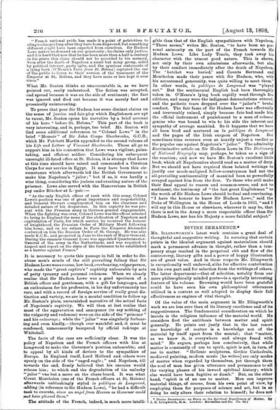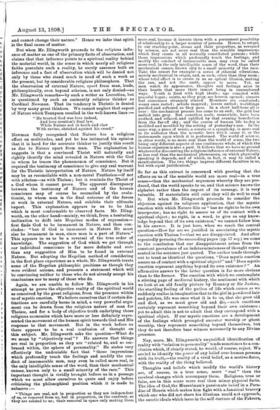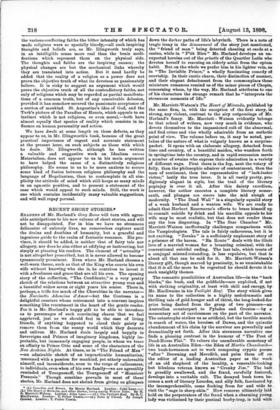DIVINE IMMANENCE.*
Mn. ILLINGWOBTH'S latest work contains a great deal of thoughtful and suggestive writing. In securing that certain points in the idealist argument against materialism should mark a permanent advance in thought, rather than a tem- porary stage reached in the perpetual ebb and flow of the controversy, literary gifts and a power of happy illustration are of great value. And in these respects Mr. Illingworth is exceptionally well endowed, alike for effective contribution on his own part and for selection from the writings of others. The latter department—that of selection, notably from our more philosophically minded poets—is a specially interesting feature of his volume. Browning would have been grateful could he have seen his own philosophical utterances utilised in a context so well adapted to display their full effectiveness as engines of vital thought.
Of the value of the main argument in Mr_ Illingworth's work we are less sure than of its literary excellence and of its suggestiveness. The fundamental consideration on which he insists is the religious influence of the material world. He considers first the antithesis between matter and spirit generally. He points out justly that in the last resort our knowledge of matter is a knowledge not of the material by itself apart from the mental ; that "matter, as we know it, is everywhere and always fused with mind." He argues, perhaps leas conclusively, that while matter is constantly of use to spirit, spirit is not, in turn, of use to matter. " Hellenic sculptures, Gothic Cathedrals, mediaeval painting, modern music [he writes] are only modes of matter when regarded by themselves, yet through them the soul of man has given utterance and permanence to all the varying phases of his inward spiritual history; which else would have been fugitive or dumb." But, on the other hand, "spirit is of no use to matter. Man can improve material things, of course, from his own point of view, by employing them for purposes of science and art, but in so doing he only alters their relation to himself; he does not • Divine imassrace: an Buoy on tha Spiritual Significancs of Matto,. By J. B. Illiugworth, LA. London : Macmillan and Co. I7.. 6d.]
and cannot change their nature." Hence we infer that spirit is the final cause of matter.
But when Mr. Illingworth proceeds to the religious influ- ence of matter as one of the primary facts of observation, and
claims that that influence points to a spiritual reality behind the material world, in the sense in which nearly all religions faiths postulate such a reality, he surely assumes both an inference and a fact of observation which will be denied not only by those who stand much in need of such a work as the present, but by considerable religious philosophers. That the observation of external Nature, apart from man, leads, philosophically, even beyond atheism, is not only denied—as Mr. Illingworth remarks—by such a writer as Lucretius, but is questioned by such an eminently religious thinker as Cardinal Newman. That its tendency is Theistic is denied by very many great thinkers. We cannot neglect that aspect of Nature which Tennyson recalled in the well-known lines :—
" He trusted God was love indeed, And love creation's final law,
While Nature red in tooth and claw With ravine, shrieked against his creed."
Newman fully recognised that Nature has a religious effect on multitudes, and yet he has intimated his opinion that it is hard for the accurate thinker to justify this result as due to Nature apart from man. The explanation he suggests is that a convinced Theist will naturally and rightly identify the mind revealed in Nature with the God to whom he traces the phenomenon of conscience. But it required the testimony of conscience to give any real warrant for the Theistic interpretation of Nature. Nature by itself may be as reconcilable with a non-moral Pantheism—if not with atheism—as with Theism ; but it reminds the Theist of a God whom it cannot prove. The apparent discrepancy between the testimony of Nature and of the human conscience may of course be reconciled by the evolu- tionist, to whom man is the final outcome of the forces at work in external Nature, and exhibits their ultimate import. This explanation appears to us to be that which is most conformable to observed facts. Mr. Thing- worth, on the other hand—mainly, we think, from a hesitating inclination to drift into Hegelian modes of expression— first finds God to be immanent in Nature, and then con- cludes : " but if God is immanent in Nature He must also be immanent in man, since man is a part of Nature."
This appears to us to be a reversal of the true order of knowledge. The suggestion of God which we get through our individual conscience is far more definite and sure than any suggestion of Him to be found in external Nature. But adopting the Hegelian method of considering in the first place experience as a whole, Mr. Illingworth treats some of the Hegelian philosophic positions as though they were evident axioms, and presents a statement which will be convincing neither to those who do not already accept his conclnsione nor to many of those who do.
Again, we are unable to follow Mr. Illingworth in his attempt to prove the objective reality of the spiritual world as conceived by the great religions, from the presence within us of mystic emotion. We believe ourselves that if certain dis- tinctions are carefully borne in mind, a very powerful argu- ment can be drawn from the religious nature of man for Theism, and for a body of objective truth underlying those religious economies which have more or less definitely repre- sented the movement of the human spirit towards God and His response to that movement. Bat in the work before us there appears to be a real confusion of thought on this subject. Mr. Illingworth asks the question—What do we mean by "objectively real" ? He answers that things are real in proportion as they are " related to, and so em- braced within, the sphere of personality." He states very effectively the undeniable fact that " those impressions which profoundly touch the feelings and modify the con- duct of innumerable men, may even be called more real, in the only intelligible sense of the word, than their mechanical causes, known only to a small minority of the race." This important thought is vividly brought before us in a passage which we must allow ourselves to quote and enjoy before criticising the philosophical position which it is made to subserve :-
"Things are real, not in proportion as they are independent of us, or removed from us, but in proportion, on the contrary, as they are related to us ; their removal in space only making them more real, because it invests them with a permanent possibility of relationship to a larger number of persons. Hence, to return to our starting-point, atoms and their properties, as revealed by science, are not more real than the sensible impressions which they create in all normally constituted persons ; while those impressions which profoundly touch the feelings, and modify the conduct of innumerable men, may even be called more real, in the only intelligible sense of the word, than their mechanical causes, known only to a small minority of the race. Take the sunset for example—a series of ethereal vibrations, merely mechanical in origin, and, as such, other than they seem ; whose total effect is to create in us an optical illusion, making the sun, and not the earth, appear to move. Yet, as men watch its appearance, thoughts and feelings arise in their hearts that move their inmost being in unnumbered ways. Youth is fired with high ideals ; age consoled with peaceful hopes ; saints, as they pray, see heaven opened; sinners feel conscience strangely stirred. Mourners are comforted; weary ones rested ; artists inspired ; lovers united ; worldlings purified and softened as they gaze. In a short half-hour all is over : the mechanical process has come to an end ; the gold has melted into grey. But countless souls, meanwhile, have been soothed, and solaced, and uplifted by that evening benediction from the far-off sky ; and the course of human life to-day is modified and moulded by the setting of yesterday's sun. In the same way, a piece of music, a sonata or a symphony, is more real to its audience than the acoustic laws which cause it, or the instruments upon which it is performed. The world of science, in other words, is no more real than the world of sense, the two being only different aspects of one continuous whole, of which the human organism is also a part. It follows that we have no ground whatever for discounting the religious influence of external Nature, as less real than the mechanical phenomena, on which physically speaking it depends, and of which, in fact, it may be called a manifestation. The two things impress different faculties in us, but with equal justification."
So far as this extract is concerned with proving that the effects on us of the sensible world are more real—in a true sense—than the mechanical sequences whereby they are pro- duced, that the world speaks to us, and that science knows the alphabet rather than the import of its message, it is very valuable. If materialists still exist they will do well to read
it. But when Mr. Illingworth proceeds to consider the objection against its religious application, that the mystic emotion with which Nature fills us " has no right to be its own interpreter ; has no right to assure us of its contact with a spiritual object ; no right, in a word, to give us any know- ledge beyond that of its own existence," we cannot follow him in his answer. It is just here, when we reach the central question—How far are we justified in associating the mystic emotion with Theism ?—that we are disappointed. And after repeatedly perusing the succeeding pages (pp. 57 seq.) we come to the conclusion that our disappointment arises from the
constant prevalence of an indeterminateness of thought repre- sented in the sentence just quoted. The author tends through- out to treat as identical the questions, "Does mystic emotion assure us of contact with a spiritual object?" and "Does mystic emotion represent anything beyond its own existence ? " An affirmative answer to the latter question is far more obvious than to the former. The emotion with which we contemplate a stirring page of medimval history, the sentiment with which we look at an old family picture by Romney or Sir Joshua, the startling feeling of the pathos of life which comes as we suddenly realise in imagination that to the girl in powdered hair and patches, life was once what it is to us, that she grew old and died, as we must grow old and die,—such emotions certainly represent something beyond their own existence : yet to admit this is not to admit that they correspond with a
spiritual object. If our mystic emotions are a development of the feelings which prompted ancestor worship or ghost worship, they represent something beyond themselves, but they do not therefore bear witness necessarily to any Divine
presence.
Nay, more, Mr. Illingworth's unqualified identification of
reality with "relation to personality" tends sometimes to a con- clusion which, if clearly stated, he would, of course, reject. We
are led to identify the power of any belief over human persons with its truth,—the reality of a vivid belief, as a motive-force, with the reality of the thing believed.
Thoughts and beliefs which modify the world's history
are, of course, in a true sense, more " real " than the cerebral changes which accompany them. Religions, true or false, are in this sense more real than minor physical facts.
The idea of God, the Mnssnlman's passionate belief in a Para- dise of Honris which makes him fight with a fanatical bravery which one who did not share hie illusions could not approach, the ascetic ideals which issue in the self -torture of the Fakeers, the various conflicting faiths the bitter intensity of which has made religious wars so specially bloody,—all such inspiring thoughts and beliefs are, as Mr. Illingworth truly says, in an intelligible sense more real than the brain modi- fications which represent them on the physical side. The thoughts and faiths are the inspiring causes; the physical changes are but the mechanical links whereby they are translated into action. But it need hardly be added that the reality of a religion as a power does not prove the objective truth of what its devotees so passionately believe. It is risky to suggest an argument which would prove the objective truth of all the contradictory faiths, not only of religions which may be regarded as partial manifesta- tions of a common truth, but of any conceivable delusion, provided it has somehow secured the passionate acceptance of a section of mankind. St. Augustine's idea of God, and the Turk's picture of the Paradise of Houris, which appeals to an instinct which is not religious, or even moral,—both have almost equally that species of reality which consists in in- fluence on human personality and action.
We have dwelt at some length on these defects, as they appear to us, in Mr. Illingworth's book, because of the great practical importance of cogent and accurate statement at the present hour, on such subjects as those with which he deals. Mr. Illingworth, although he has written a valuable and suggestive work on Idealism versus Materialism, does not appear to us in his main argument to have helped the cause of a distinctively religious philosophy. He seems to us to be more anxious to secure some kind of fusion between religious philosophy and the language of Hegelianism, than to contemplate in all sim- plicity the attitude of mind which still keeps so many minds in an agnostic position, and to present a statement of the case which would appeal to such minds. Still, the work is one which contains incidentally many valuable suggestions, and will well repay perusal.




































 Previous page
Previous page